天津市大口屯高级中学2018-2019学年高二下学期第一次阶段性测试英语试题(无听力音频及材料)
文档属性
| 名称 | 天津市大口屯高级中学2018-2019学年高二下学期第一次阶段性测试英语试题(无听力音频及材料) | 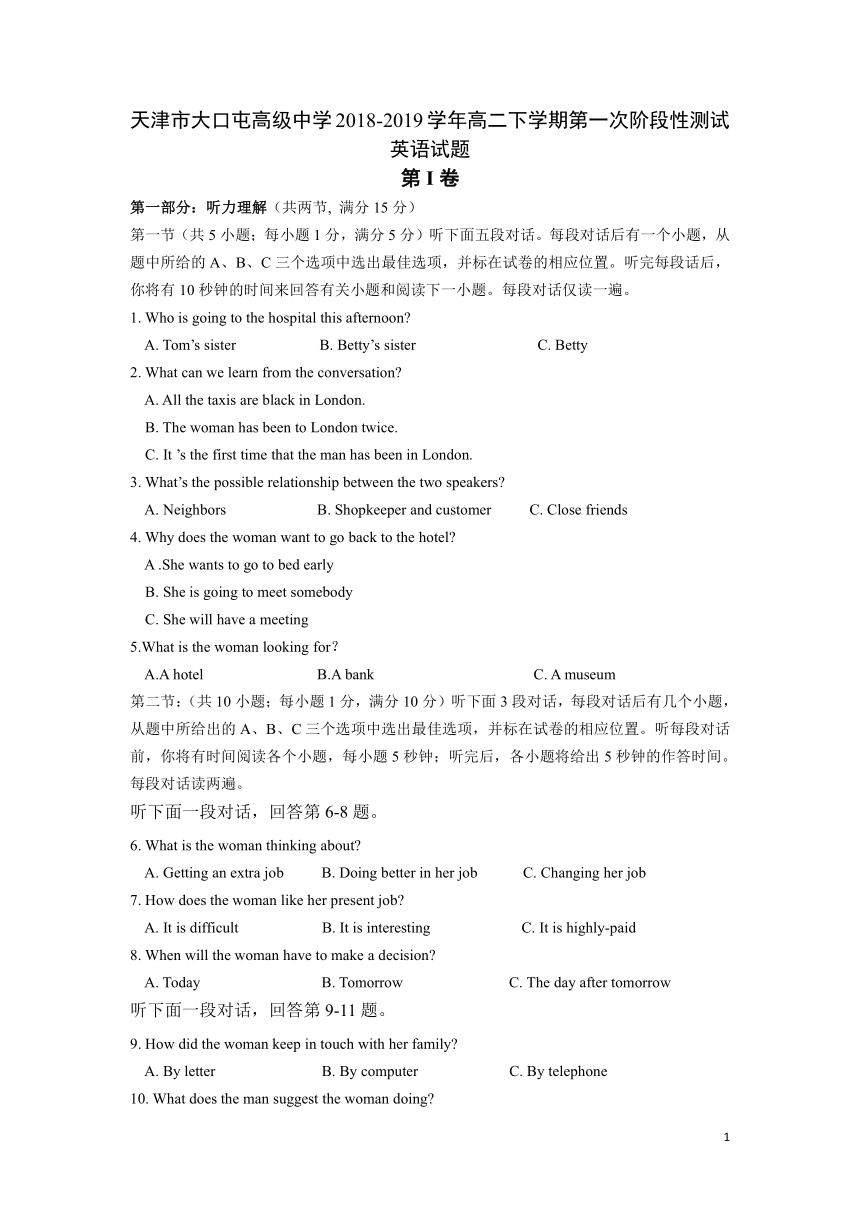 | |
| 格式 | zip | ||
| 文件大小 | 1.0MB | ||
| 资源类型 | 教案 | ||
| 版本资源 | 外研版 | ||
| 科目 | 英语 | ||
| 更新时间 | 2019-04-03 10:39:08 | ||
图片预览

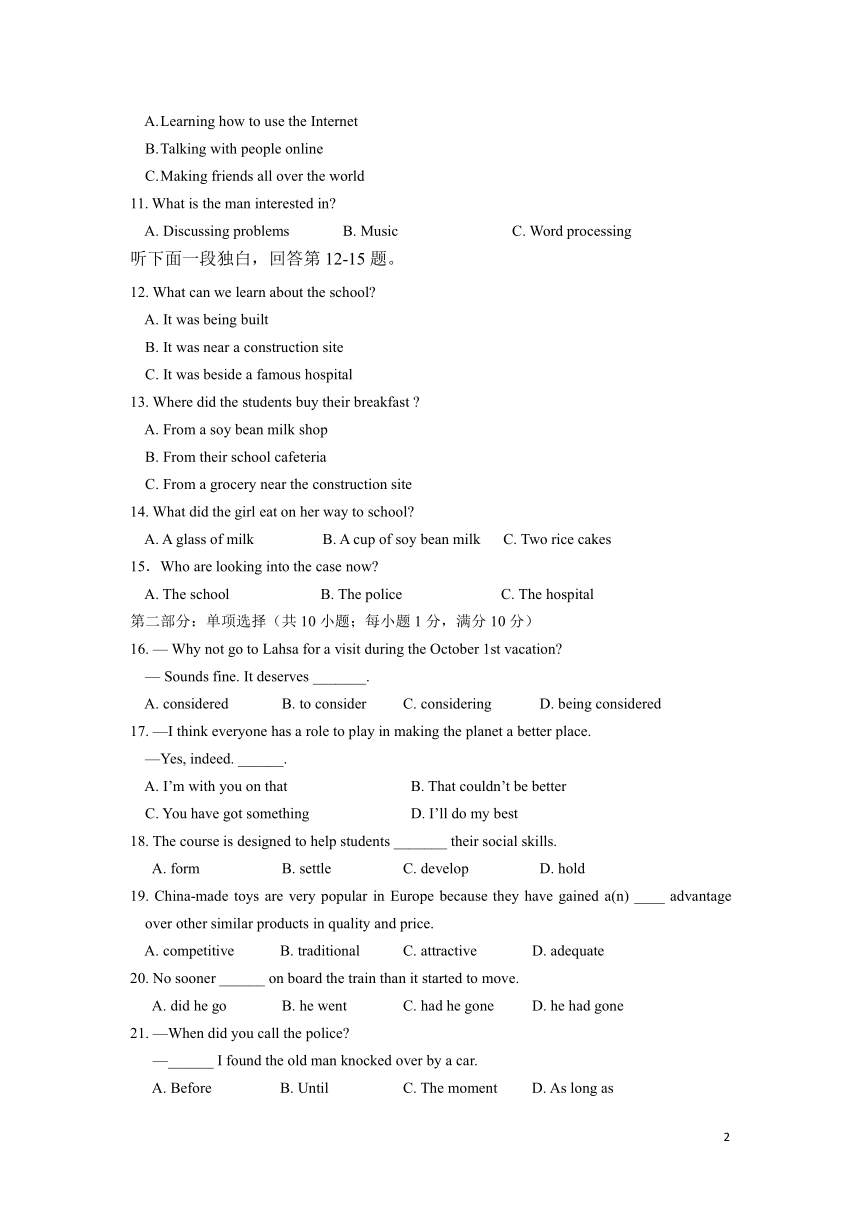
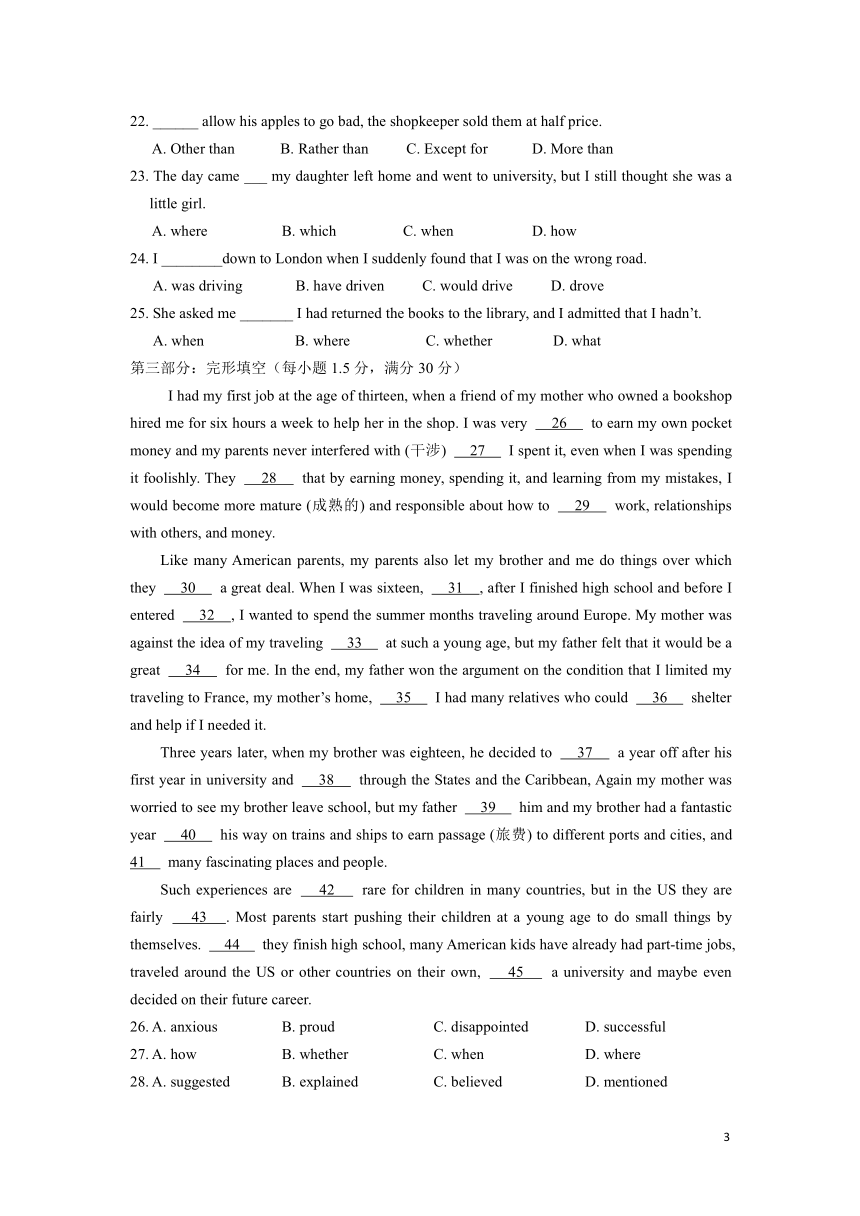
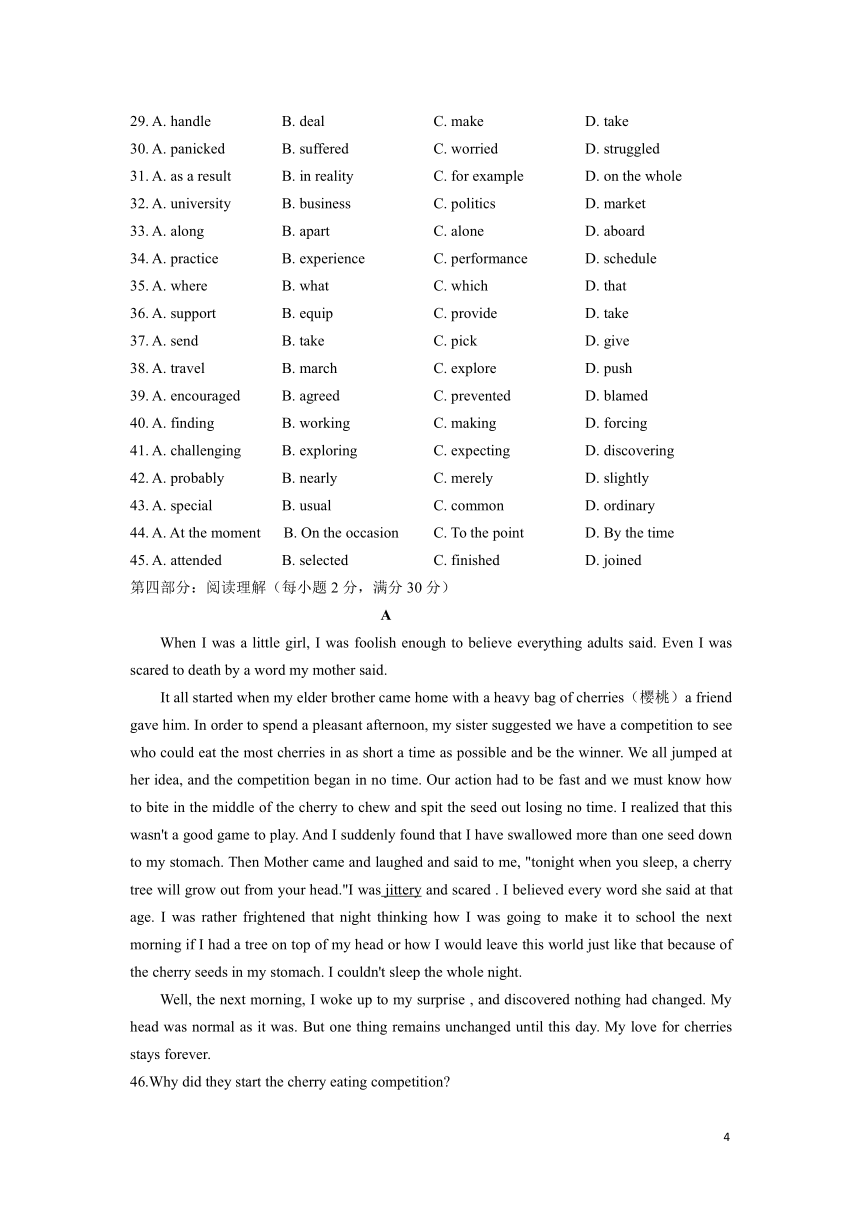
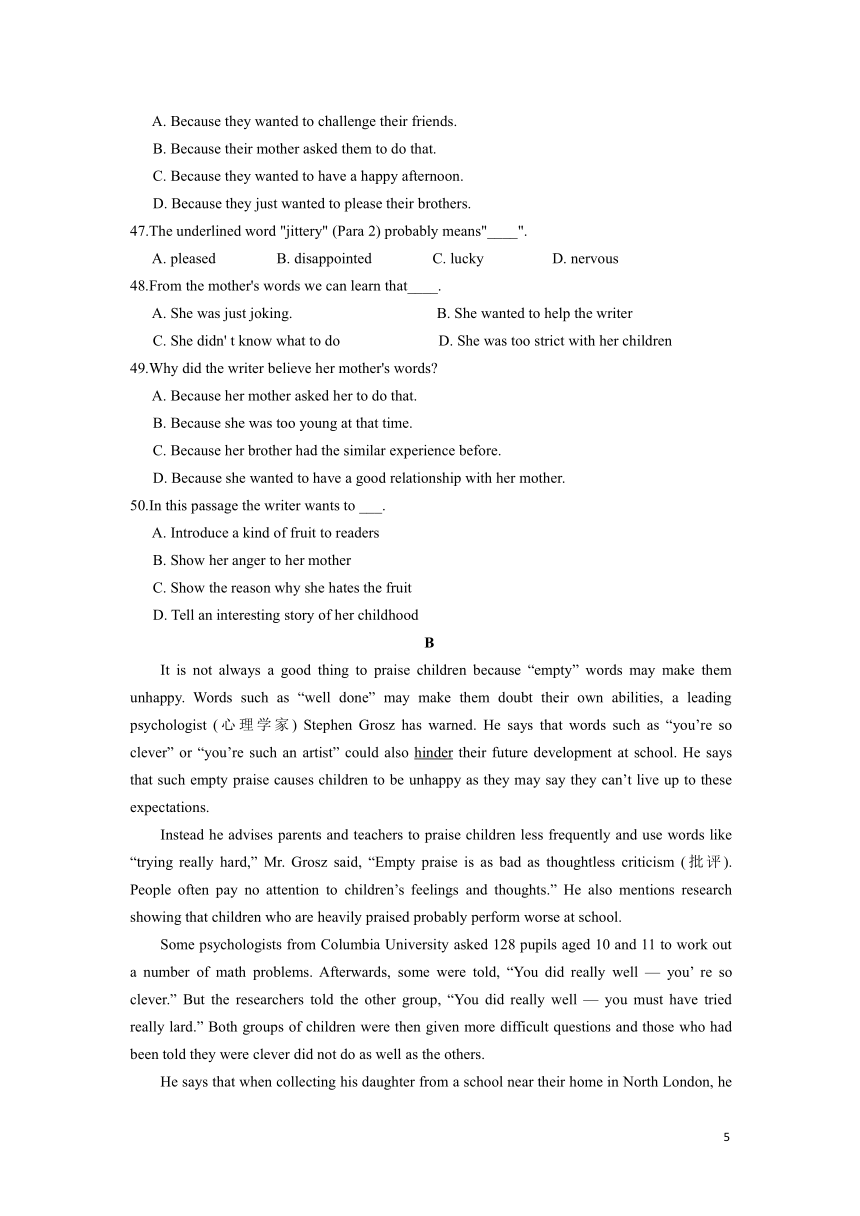
文档简介
天津市大口屯高级中学2018-2019学年高二下学期第一次阶段性测试英语试题
第I卷
第一部分:听力理解(共两节, 满分15分)
第一节(共5小题;每小题1分,满分5分)听下面五段对话。每段对话后有一个小题,从题中所给的A、B、C三个选项中选出最佳选项,并标在试卷的相应位置。听完每段话后,你将有10秒钟的时间来回答有关小题和阅读下一小题。每段对话仅读一遍。
1. Who is going to the hospital this afternoon?
A. Tom’s sister B. Betty’s sister C. Betty
2. What can we learn from the conversation?
A. All the taxis are black in London.
B. The woman has been to London twice.
C. It ’s the first time that the man has been in London.
3. What’s the possible relationship between the two speakers?
A. Neighbors B. Shopkeeper and customer C. Close friends
4. Why does the woman want to go back to the hotel?
A .She wants to go to bed early
B. She is going to meet somebody
C. She will have a meeting
5.What is the woman looking for?
A.A hotel B.A bank C. A museum
第二节:(共10小题;每小题1分,满分10分)听下面3段对话,每段对话后有几个小题,从题中所给出的A、B、C三个选项中选出最佳选项,并标在试卷的相应位置。听每段对话前,你将有时间阅读各个小题,每小题5秒钟;听完后,各小题将给出5秒钟的作答时间。每段对话读两遍。
听下面一段对话,回答第6-8题。
6. What is the woman thinking about?
A. Getting an extra job B. Doing better in her job C. Changing her job
7. How does the woman like her present job?
A. It is difficult B. It is interesting C. It is highly-paid
8. When will the woman have to make a decision?
A. Today B. Tomorrow C. The day after tomorrow
听下面一段对话,回答第9-11题。
9. How did the woman keep in touch with her family?
A. By letter B. By computer C. By telephone
10. What does the man suggest the woman doing?
A. Learning how to use the Internet
B. Talking with people online
C. Making friends all over the world
11. What is the man interested in?
A. Discussing problems B. Music C. Word processing
听下面一段独白,回答第12-15题。
12. What can we learn about the school?
A. It was being built
B. It was near a construction site
C. It was beside a famous hospital
13. Where did the students buy their breakfast ?
A. From a soy bean milk shop
B. From their school cafeteria
C. From a grocery near the construction site
14. What did the girl eat on her way to school?
A. A glass of milk B. A cup of soy bean milk C. Two rice cakes
15.Who are looking into the case now?
A. The school B. The police C. The hospital
第二部分:单项选择(共10小题;每小题1分,满分10分)
16. — Why not go to Lahsa for a visit during the October 1st vacation?
— Sounds fine. It deserves _______.
A. considered B. to consider C. considering D. being considered
17. —I think everyone has a role to play in making the planet a better place.
—Yes, indeed. ______.
A. I’m with you on that B. That couldn’t be better
C. You have got something D. I’ll do my best
18. The course is designed to help students _______ their social skills.
A. form B. settle C. develop D. hold
19. China-made toys are very popular in Europe because they have gained a(n) ____ advantage over other similar products in quality and price.
A. competitive B. traditional C. attractive D. adequate
20. No sooner ______ on board the train than it started to move.
A. did he go B. he went C. had he gone D. he had gone
21. —When did you call the police?
—______ I found the old man knocked over by a car.
A. Before B. Until C. The moment D. As long as
22. ______ allow his apples to go bad, the shopkeeper sold them at half price.
A. Other than B. Rather than C. Except for D. More than
23. The day came ___ my daughter left home and went to university, but I still thought she was a little girl.
A. where B. which C. when D. how
24. I ________down to London when I suddenly found that I was on the wrong road.
A. was driving B. have driven C. would drive D. drove
25. She asked me _______ I had returned the books to the library, and I admitted that I hadn’t.
A. when B. where C. whether D. what
第三部分:完形填空(每小题1.5分,满分30分)
I had my first job at the age of thirteen, when a friend of my mother who owned a bookshop hired me for six hours a week to help her in the shop. I was very 26 to earn my own pocket money and my parents never interfered with (干涉) 27 I spent it, even when I was spending it foolishly. They 28 that by earning money, spending it, and learning from my mistakes, I would become more mature (成熟的) and responsible about how to 29 work, relationships with others, and money.
Like many American parents, my parents also let my brother and me do things over which they 30 a great deal. When I was sixteen, 31 , after I finished high school and before I entered 32 , I wanted to spend the summer months traveling around Europe. My mother was against the idea of my traveling 33 at such a young age, but my father felt that it would be a great 34 for me. In the end, my father won the argument on the condition that I limited my traveling to France, my mother’s home, 35 I had many relatives who could 36 shelter and help if I needed it.
Three years later, when my brother was eighteen, he decided to 37 a year off after his first year in university and 38 through the States and the Caribbean, Again my mother was worried to see my brother leave school, but my father 39 him and my brother had a fantastic year 40 his way on trains and ships to earn passage (旅费) to different ports and cities, and 41 many fascinating places and people.
Such experiences are 42 rare for children in many countries, but in the US they are fairly 43 . Most parents start pushing their children at a young age to do small things by themselves. 44 they finish high school, many American kids have already had part-time jobs, traveled around the US or other countries on their own, 45 a university and maybe even decided on their future career.
26. A. anxious B. proud C. disappointed D. successful
27. A. how B. whether C. when D. where
28. A. suggested B. explained C. believed D. mentioned
29. A. handle B. deal C. make D. take
30. A. panicked B. suffered C. worried D. struggled
31. A. as a result B. in reality C. for example D. on the whole
32. A. university B. business C. politics D. market
33. A. along B. apart C. alone D. aboard
34. A. practice B. experience C. performance D. schedule
35. A. where B. what C. which D. that
36. A. support B. equip C. provide D. take
37. A. send B. take C. pick D. give
38. A. travel B. march C. explore D. push
39. A. encouraged B. agreed C. prevented D. blamed
40. A. finding B. working C. making D. forcing
41. A. challenging B. exploring C. expecting D. discovering
42. A. probably B. nearly C. merely D. slightly
43. A. special B. usual C. common D. ordinary
44. A. At the moment B. On the occasion C. To the point D. By the time
45. A. attended B. selected C. finished D. joined
第四部分:阅读理解(每小题2分,满分30分)
A
When I was a little girl, I was foolish enough to believe everything adults said. Even I was scared to death by a word my mother said.
It all started when my elder brother came home with a heavy bag of cherries(樱桃)a friend gave him. In order to spend a pleasant afternoon, my sister suggested we have a competition to see who could eat the most cherries in as short a time as possible and be the winner. We all jumped at her idea, and the competition began in no time. Our action had to be fast and we must know how to bite in the middle of the cherry to chew and spit the seed out losing no time. I realized that this wasn't a good game to play. And I suddenly found that I have swallowed more than one seed down to my stomach. Then Mother came and laughed and said to me, "tonight when you sleep, a cherry tree will grow out from your head."I was jittery and scared . I believed every word she said at that age. I was rather frightened that night thinking how I was going to make it to school the next morning if I had a tree on top of my head or how I would leave this world just like that because of the cherry seeds in my stomach. I couldn't sleep the whole night.
Well, the next morning, I woke up to my surprise , and discovered nothing had changed. My head was normal as it was. But one thing remains unchanged until this day. My love for cherries stays forever.
46.Why did they start the cherry eating competition?
A. Because they wanted to challenge their friends.
B. Because their mother asked them to do that.
C. Because they wanted to have a happy afternoon.
D. Because they just wanted to please their brothers.
47.The underlined word "jittery" (Para 2) probably means"____".
A. pleased B. disappointed C. lucky D. nervous
48.From the mother's words we can learn that____.
A. She was just joking. B. She wanted to help the writer
C. She didn' t know what to do D. She was too strict with her children
49.Why did the writer believe her mother's words?
A. Because her mother asked her to do that.
B. Because she was too young at that time.
C. Because her brother had the similar experience before.
D. Because she wanted to have a good relationship with her mother.
50.In this passage the writer wants to ___.
A. Introduce a kind of fruit to readers
B. Show her anger to her mother
C. Show the reason why she hates the fruit
D. Tell an interesting story of her childhood
B
It is not always a good thing to praise children because “empty” words may make them unhappy. Words such as “well done” may make them doubt their own abilities, a leading psychologist (心理学家) Stephen Grosz has warned. He says that words such as “you’re so clever” or “you’re such an artist” could also hinder their future development at school. He says that such empty praise causes children to be unhappy as they may say they can’t live up to these expectations.
Instead he advises parents and teachers to praise children less frequently and use words like “trying really hard,” Mr. Grosz said, “Empty praise is as bad as thoughtless criticism (批评). People often pay no attention to children’s feelings and thoughts.” He also mentions research showing that children who are heavily praised probably perform worse at school.
Some psychologists from Columbia University asked 128 pupils aged 10 and 11 to work out a number of math problems. Afterwards, some were told, “You did really well — you’ re so clever.” But the researchers told the other group, “You did really well — you must have tried really lard.” Both groups of children were then given more difficult questions and those who had been told they were clever did not do as well as the others.
He says that when collecting his daughter from a school near their home in North London, he heard a teacher tell her, “You have drawn the most beautiful tree. Well done,” Later, after she had done another drawing, the same teacher said, “Wow, you are really an artist.” In his book, Mr. Grosz writes, “How could I explain to the teacher that I would prefer it if she did not praise my daughter?”
As a parent of two children, I strongly agree with Mr. Grosz. I praise them when praising is proven right. I want them to know if I praise them, they have done something beyond my expectation, beyond what they are able to do.
51. The underlined word “hinder” in Paragraph 1 probably means”_______”.
A. allow B. prevent C. encourage D. control
52. Which of the following praise does Mr. Grosz like most?
A. You are so clever! B. Well done, darling!
C. You are such an artist! D. You must have tried hard!
53. The example of 128 pupils is given to show _______.
A. teaching children is a difficult job
B. children’s growing interest in math
C. the disadvantage of praising children strongly
D. children are becoming cleverer and cleverer
54. Hearing what that teacher said, Mr. Grosz _______.
A. realized the importance of praise
B. was very proud of her daughter
C. didn’t know how to thank her
D. was not really satisfied
55. What does the author mainly tell us in the text?
A. Too much praise can sometimes hurt children.
B. Praise makes good men better and bad men worse.
C. Parents should spend more time with their children.
D. Many children can t live up to their parents’ expectations.
C
Moby Dick is an amazing book. I like it thinking it’s one of those classics you really should read. For me the charm of this book was in the way Herman Melville wrote about whales and the whaling industry. He seemed to view whales with such awe, wonder and worship. As you read this book, you are buoyed(鼓舞) along by his enthusiasm for the splendor and gloriousness of whales. He gives the highest honor to the profession of whaling and highlights the extreme danger the men would have undergone.
What I introduce to you first of all is Ishmael, a simple young man looking for adventure on a vessel. He wants to see the world. Through circumstances he meets harpooneer(渔叉手) Queequeg, and the two become firm friends. They decide to start a whaling voyage together. Their captain will be Captain Ahab, who mysteriously is not present for the loading of the vessel. He also does not appear on deck for several days after their voyage starts. They are not just hunting any whales. They are after Moby Dick — the white whale. Many men have gone after him and suffered for it. Ahab himself had tried for him and lost his leg to the whale. The most part of the novel tells his mission of revenge.
Herman has real enthusiasm for his subject which draws you in and makes you want to know more. Each character is developed with considerable depth, especially Captain Ahab. You can get into his mind, think what he thinks, feel what he feels.
Published by Pengine Popular Classics, this book boasts a whopping(巨大的) 536 pages. It comes with a short introduction telling you who Herman Melville was and why he wrote this book, which may be interesting to some.
Available at Amazon.co.uk for £1.50 and usually dispatched within 24 hrs.
56. What’s the author’s purpose of introducing the book “Moby Dick”?
A. He wants to take adventures. B. He wants to be famous.
C. He wants to become a captain. D. He wants to sell more books.
57. Who is the hero in this book?
A. Ishmael. B. Queequeg. C. Dick. D. Ahab.
58. What’s the story mainly about?
A. Whales and the whaling industry. B. Two firm friends.
C. Revenge on Moby Dick. D. Ahab and his lost leg.
59. Which of the following may NOT be the attraction for you to read the book?
A. Herman has real enthusiasm for his subject.
B. Each character is developed with considerable depth.
C. It’s published by Pengine Popular Classics.
D. The short introduction tells you who Herman Melville was and why he wrote
this book.
60. What’s the meaning of the underlined word “vessel” in the second Paragraph?
A. Train. B. Ship. C. Container. D. Tube.
第II卷
第一部分:根据下列句子及所给汉语提示, 在指定位置写出空缺处各单词的正确形式。(每空只写一词; 请将答案写在答题卡上,每题0.5分,共5分)
61. I must make an ________(歉意)for not being able to meet you.
62. The best ________(方法)to learning a foreign language is the study of spoken English.
63. Unfortunately, there has been a sharp d_______ in profits this year.
64. I lost your address, o_______I would have visited you before.
65.Mum always worked out household _________(预算) according to what we could afford.
66. We can’t guarantee the p________ arrival of trains in foggy weather.
67. They a_______him captain of the team, which made him very surprised.
68.He is a d_______ man , in other words, he is full of energy.
69.His performance was the _________(最精彩的部分)of the show.
70.There was once a town in this country where life seemed to live in ________(和谐)with its surroundings.
第二部分:阅读表达(每小题2分,满分10分)
阅读下面短文,并根据要求完成文章后的题目. (请注意问题后的字数要求. )
For many teenagers, a job is a way to earn a little extra money. For me, it is more than that.
At the age of 16, I was offered my very first job as a shopgirl in a clothing store. On the first day, my manager was training me how to fold and organize platform after platform of clothes. The work seemed overwhelming, and everything had to be done in an accurate way. I got so impatient because I couldn’t get it right the first couple of times. After about ten tries, I had the clothes folded (折叠) perfectly. Then it took me thirty minutes to get them all looking uniform. Now, I fold and organize clothes every day, and I’m able to do them well. Through this experience, I’ve learned to be patient.
Helping customers and establishing connections with them is one of the things I love most about my job. About two months ago, I helped a woman who was looking for a dress. She told me exactly what she was picturing—a blue dress with long sleeves and a lace (花边) neck. We didn’t have any such dress, and when I explained that to her, she wasn’t very happy. Instead of getting annoyed, I tried getting to know her a bit better and asked what the dress was for, so I could find other items in her size that could work. We shared our love of the Netflix fashion show, and she ended up buying $200 worth of new clothes, having found other items she liked. This experience has taught me to be more open with strangers.
Every job has its share of frustrations (挫折) and challenges; to do well you must learn to deal with them. I’ve learned this from my own experience, and it has helped me in other aspects of my life as well.
71. What was the author’s first job? (no more than 5 words)
_____________________________________________________________________________
72. What is the meaning of the underlined word in Para. 2? (no more than 3 words)
____________________________________________________________________________
73. How did the author manage to meet the customer’s needs in Para. 3? (no more than 15 words)
_____________________________________________________________________________
74. How has the author’s work experience changed her in personality? (no more than 10 words)
_____________________________________________________________________________
75. What job would you like to do? How can you help people in your work? (no more than 20 words)
_____________________________________________________________________________
第三部分:书面表达(满分20分)
为吸引更多的留学生到你校学习,校学生会及决定拍摄一部反映学校生活的小电影,现在招募学生演员。请你以学生会的名义,根据以下提示撰写一个通知。
1). 此次活动的目的 2). 演员需要具备的条件:沟通能力强,擅长英语……(可适当发挥)
3). 小电影内容简介 4). 最后报名期限:下周一前到学生会报名
注意:
1). 词数不少于100 2). 可适当加入细节,使内容充实、行文连贯3). 通知格式已给出,不计入总数
NOTICE
______________________________________________________________________________________________________________________________________________________________________________________________________________________________________ Thank you.
PAGE
2
同课章节目录
